by Matt Gomes, Michigan State University
Panelists
Laura Gonzales, Michigan State University
Maria Novotny, Michigan State University
Katie Manthey, Michigan State University
Overview
This panel consisted of three graduate students from the PhD program in Rhetoric and Writing at Michigan State University, Laura Gonzales, Maria Novotny, and Katie Manthey, whose work converged on the common theme of how their lived experiences and physical bodies have played a role in the development of their academic interests and identities, focusing in particular on how their lives and research interests interact with their positions as graduate students. In this sense, their bodies act as important interfaces where identities interact with the academic systems of knowledge production – systems that have historically obscured the dialogic and mutually-constructive relationship between academic identities and academic knowledge.
Language, Silence, Passing
Gonzales explored her relationship to language, and pointed to the ways that her history as an English language learner played a role in shaping her current research, which involves multilingual writers. While rhetoric and composition offer this research as an important affordance, Gonzales spoke of an awareness of the norming power of the academy.
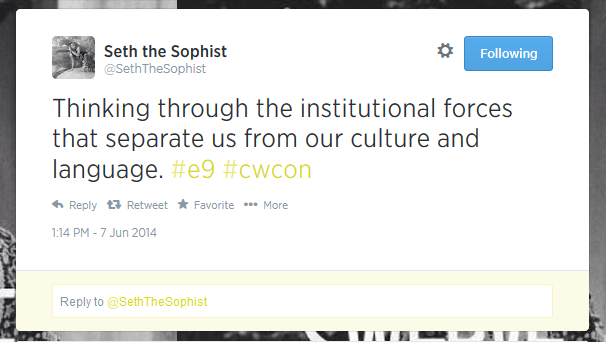
Specifically, Gonzales noted that as a young multilingual speaker and writer in the United States, silence offered a rhetorical strategy that allowed her to pass, and fit in better with her new American colleagues.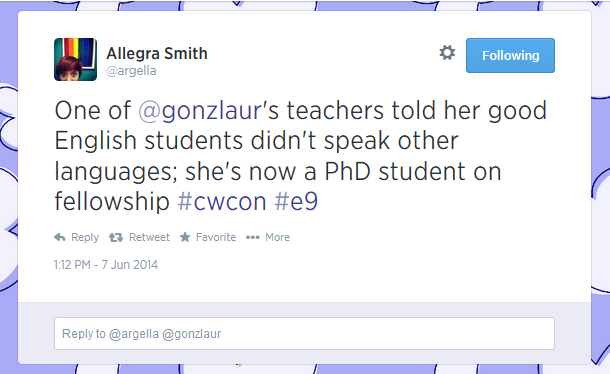
This same strategy, however, continues to serve her in graduate school, and as a young member of rhetoric and composition. While academia has offered the ability to draw upon her personal experience as a place from which to perform research, it also continually regulates her work.
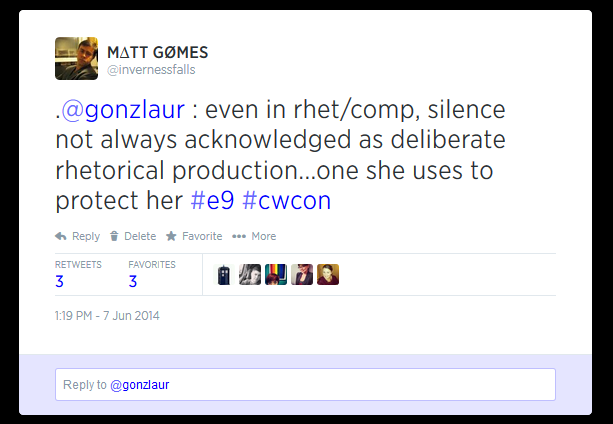
Infertility, Heteronormativity, and Queer Theory
Novotny described two coinciding moments in her life: her entry into graduate school, and her discovery of her own infertility.
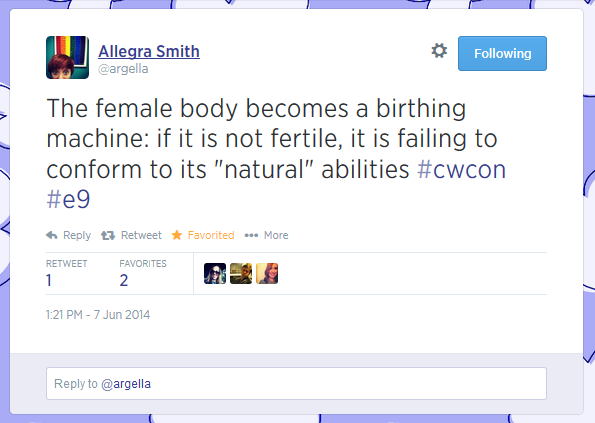
As she and her husband struggled with doctors’ efforts to “fix” her body, academia offered a discourse for naming and critiquing a bio-medicalization of systemic heteronormativity.
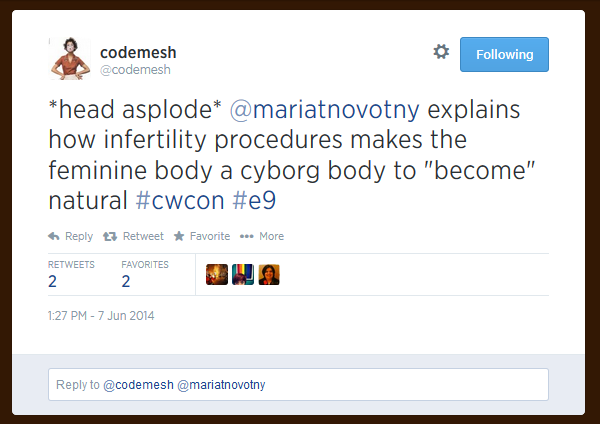
Queer theory in particular provided a Novotny with a language for relocating her identity, which she’d been dislocated from through the heteronormative discourse of infertility.
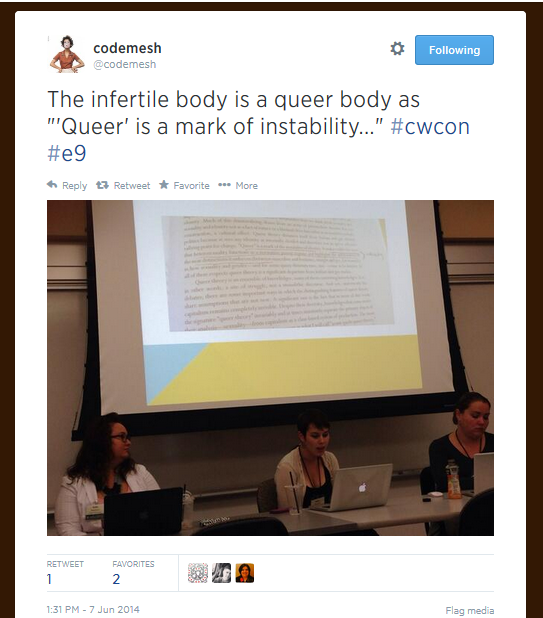
Fat Studies
Manthey described how the academy provided a space for her to do work at the intersection of fatness studies and fashion, and how this related to her identity and acceptance of her body. However, in a particularly moving moment, she also drew attention to the way academic rituals like conferences exerted a norming power over bodies, specifically pointing to the dress codes of conference.
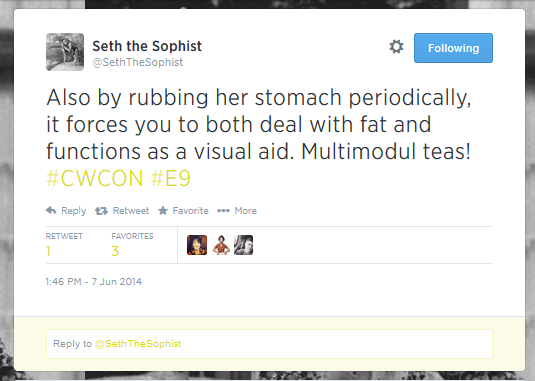
In this moment, Manthey adjusted her outfit to demonstrate how it would look if she wore her clothes in the way that was most comfortable for her, and to show “what a fucking person looks like!”
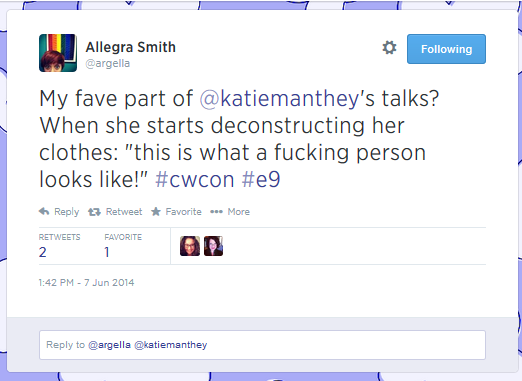
Manthey went on to elaborate other academic scenes which exerted similar degrees of bodily norming, especially for graduate students.
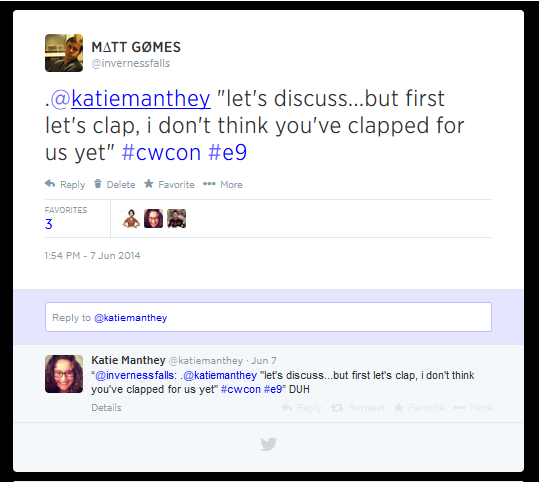
Response
The session was attended primarily by graduate students, who generally responded very positively to the three presentations. Specifically, many appeared to identify strongly with a theme that was common to all three presentations, and manifested as a profound ambivalence out life in the academy.
The presenters identified specific academic discourses as providing a language for resisting hegemonic discourses of language ideology, sexuality, and body image. Novotny, for example, identified queer theory as a productive discourse that allowed her to claim infertility as an identity that resists a heteronormative regulation of womanhood. All three used the affordances of the conference itself to articulate the significance of their identities and their bodies as “interfaces” mediating their academic work.
However, beneath the liberatory discourses that helped presenters bring their selves into their work, they also expressed an acute feeling of regulation, which normed their bodies and their discourses. In an especially striking moment, Manthey used the space of the presentation to expose (literally) how her physical body is regulated by “neoliberal discourses” tethering health to body image, and compelling her to wear clothes in ways that hide her body. However, in the same presentation, Manthey expressed how the expectations of the job market will likely reproduce those same pressures, encouraging her to again hide her self, despite her academic work.
Perhaps because the audience for the session was composed mostly of graduate students, there was a degree to which this panel was therapeutic, allowing the attendants to articulate and affirm their own struggles with and ambivalences toward academia. While this panel provided a valuable, safe space for talking openly about our positions as graduate students trying to negotiate the field of rhetoric and composition, these stories also need to be heard by more senior members of the academy, especially those who occupy the kinds of positions that would allow for direct intervention in academic and professional experiences.
If you would like to see more tweets from this session, you can do so by following this link.
